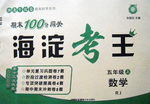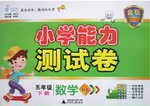题目内容
| |||||||||||||||||||||||||||||||||||||||||||||

 期末100分闯关海淀考王系列答案
期末100分闯关海淀考王系列答案 小学能力测试卷系列答案
小学能力测试卷系列答案阅读下面短文, 掌握其大意, 然后从1—25各题所给的四个选项中, 选出一个最佳答案。
China is one of the oldest countries in the world. She has a 1 of over forty-four thousand years. No one is 2 where the first people 3 came from. Yes, we know that bones of some of the 4 people have been found near Beijing, the capital of China, and near the Yellow River, 5 runs across North China 6 a huge dragon (龙) and 7 its way from west to east. There are many 8 about how the world began and who the first kings were. One story tells of how ten suns shone in 9 and how Hou Yi shot down 10 of them. Another story tells about how Huang Di, the Yellow Emperor (皇帝), 11 Tsi You and united different parts of the country into one 12 . The ancient Chinese did a lot of wonders, 13 was the Great Wall. It came 14 in the 220's B.C. It took many years to build. Seeing the Great wall,which is 15 enough for ten soldiers to march 16 along its top. You can't help 17 how all the work was done 18 .
People in ancient times 19 in magic (魔法) used to say that Emperor Qin Shihuang 20 across the mountains 21 magic horse. The wall 22 under him as he went along. Wherever the horse 23 its foot heavily, a watch-tower appeared. But the wall was not made by 24 . It was made 25 and lives of thousands of men.
|
1. A. period |
B.population |
C.Culture |
D. history |
[ ] |
|
2. A. told |
B.interested in |
C. asked |
D. shown |
[ ] |
|
3. A. inChina |
B. in Beijing |
C. on earth |
D. in North |
[ ] |
|
4. A. living |
B. old |
C. first |
D. world |
[ ] |
|
5. A. that |
B. which |
C. where |
D. it |
[ ] |
|
6. A. like |
B. with |
C. under |
D. as |
[ ] |
|
7. A. winds |
B. takes |
C. finds |
D. shows |
[ ] |
|
8. A. books |
B. says |
C. stories |
D. words |
[ ] |
|
9. A. spare |
B. the sky |
C. summer |
D. the night |
[ ] |
|
10. A. all |
B. half |
C. one |
D. nine |
[ ] |
|
11. A. beat |
B. beated |
C. win |
D. won |
[ ] |
|
12. A. kingdom |
B.Capital |
C. world |
D. part |
[ ] |
|
13. A. of which |
B. whose one |
C. among it |
D. one of which |
[ ] |
|
14. A. out |
B. into being |
C. over |
D. true |
[ ] |
|
15. A. high |
B. big |
C. strong |
D. wide |
[ ] |
|
16. A. side by side |
B. together |
C. forward |
D. in good order |
[ ] |
|
17. A. wonder |
B. wondering |
C. wondered |
D. to wonder |
[ ] |
|
18. A. by hand |
B. with hand |
C. through hand |
D. using hand |
[ ] |
|
19. A. believe |
B. believing |
C. to believe |
D. believed |
[ ] |
|
20. A. ride |
B. rode |
C.ridden |
D. had ridden |
[ ] |
|
21. A. on |
B. in |
C. by |
D. for |
[ ] |
|
22. A.Disappeared |
B. appeared |
C. ran |
D. broke |
[ ] |
|
23. A. gave |
B. put |
C. got |
D. arrived |
[ ] |
|
24. A. saying |
B. the horse |
C. magic |
D. itself |
[ ] |
|
25. A. the work |
B. by the work |
C. the bodies |
D. by the hand |
[ ] |
完形填空:
Dolphins(海豚) are social animals.Many of them even 1 around humans. 2 being playful, they are helpful to men.For example, 3 400 B.C.the Greek poet Arion was saved from 4 by a dolphin. 5 , dolphins have been helping swimmers 6 in trouble.Swimmers, however, are not 7 humans they help.In some parts of the world, they help men 8 fish.
Dolphins are very clever. 9 brain is even larger than a human brain.Therefore, some people think a dolphin 10 smarter than a man.But 11 , brain size is not the only measure of cleverness.Besides, 12 dolphins’ cleverness in other ways is not possible 13 men cannot talk with them.But we can almost 14 which seem to be 17 a form of language.Up to now men 18 able to find out how dolphins are talking.So no one really knows 19 they have in mind.If we could talk with them, perhaps they could teach us to be 20 they seem to be.
|
1. A.enjoy to be |
B.are used to be |
|
C.enjoy being |
D.fond of being |
| 2. A.In addition | B.In addition to |
| C.Except for | D.With the exception of |
|
3. A.as far as |
B.as long as |
|
C.as soon as |
D.as early as |
| 4. A.dead | B.being dead |
| C.drowning | D.killing |
|
5. A.Since |
B.Ever since then |
|
C.Until then |
D.From now |
| 6. A.to be | B.who |
| C.who being | D.who are |
|
7. A.only |
B.the only |
|
C.just only |
D.the just |
| 8. A.catching | B.catch |
| C.being caught | D.caught |
|
9. A.A dolphin |
B.A dolphin and his |
|
C.A dolphin’s |
D.Dolphins’ |
| 10.A.will be | B.must be |
| C.can’t be | D.mustn’t be |
|
11.A.of course |
B.in the end |
|
C.by nature |
D.on the contrary |
| 12.A.measure | B.for measure |
| C.measuring | D.for measuring |
|
13.A.since |
B.and |
|
C.unless |
D.but |
| 14.A.sure | B.certain |
| C.be sure | D.be certainly |
|
15.A.people |
B.fish |
|
C.humans |
D.each other |
| 16.A.voice | B.noise |
| C.sounds | D.cries |
|
17.A.at least |
B.as |
|
C.nothing like |
D.possible |
| 18.A.have been | B.haven’t been |
| C.will be | D.won’t be |
|
19.A.why |
B.where |
|
C.what |
D.which |
| 20.A.happy like | B.happily like |
| C.as happy as | D.as happily as |
完形填空
Geoffrey Moorhouse's Travel Plan
Geoffrey Moorhouse was flying home to England from Africa in 1971, when he looked __1__ the plane and suddenly thought how huge and __2__ the Sahara Desert was. There and then, he decided to __3__ it by himself by camel.
For many __4__ men had crossed the Desert from the __5__ and south to trade. But there had been __6__ point in crossing from __7__ to east. So no one had done it __8__ 1963, when twelve Belgians drove across. If he went __9__, by camel, it would be __10__. Moorhouse did not __11__ to go just for fun. But what other __12__ was there? Immediately he knew. He would go because he was afraid. “I would use this journey to __13__ for fear.”
A year passed __14__ he was free to begin his __15__. He was forty. He had never __16__ a camel. He spoke no Arabic. And he did not know how to __17__ himself by the stars. His friends thought he would soon __18__ such an impossible plan.
He did not. To take advantage of(利用)the desert winter, he decided to __19__ England early in October 1972. He had six months to get __20__. He began learning Arabic-school lessons in the __21__, and listening to __22__ at home in the afternoon. He made a lot of visits to the London Zoo to learn about camels. At night, he studied the __23__. Maps and compass(指南针)are not enough in the desert. You must know __24__ where you are, and for that you must be able to “read” the stars with a sextant(六分仪).
Moorhouse planned to begin his __25__ from the Atlantic coast of Africa, and ride through Mauritania, Mali, Algeria and Libya into Egypt, where he hoped to reach the River Nile.
| 1. | ||||
[ ] |
||||
| A. after | B. for | C. out of | D. into | |
| 2. | ||||
[ ] |
||||
| A. yellow | B. hot | C. beautiful | D. empty | |
| 3. | ||||
[ ] |
||||
| A. owe | B. cross | C. pass | D. finish | |
| 4. | ||||
[ ] |
||||
| A. days | B. months | C. centuries | D. reasons | |
| 5. | ||||
[ ] |
||||
| A. east | B. south | C. west | D. north | |
| 6. | ||||
[ ] |
||||
| A. a | B. no | C. one | D. some | |
| 7. | ||||
[ ] |
||||
| A. east | B. south | C. west | D. north | |
| 8. | ||||
[ ] |
||||
| A. to | B. after | C. until | D. in | |
| 9. | ||||
[ ] |
||||
| A. alone | B. by | C. slowly | D. faster | |
| 10. | ||||
[ ] |
||||
| A. difficult | B. easy | C. successful | D. enough | |
| 11. | ||||
[ ] |
||||
| A. start | B. want | C. take off | D. refuse | |
| 12. | ||||
[ ] |
||||
| A. reason | B. person | C. plan | D. travel | |
| 13. | ||||
[ ] |
||||
| A. explain | B. show | C. examine | D. enjoy | |
| 14. | ||||
[ ] |
||||
| A. after | B. as | C. because | D. before | |
| 15. | ||||
[ ] |
||||
| A. preparations | B. trip | C. holidays | D. writing | |
| 16. | ||||
[ ] |
||||
| A. had | B. fed | C. seen | D. touched | |
| 17. | ||||
[ ] |
||||
| A. live | B. stay | C. move | D. guide | |
| 18. | ||||
[ ] |
||||
| A. begin | B. drop | C. finish | D. make | |
| 19. | ||||
[ ] |
||||
| A. return to | B. work in | C. leave | D. leave for | |
| 20. | ||||
[ ] |
||||
| A. ready | B. back | C. there | D. off | |
| 21. | ||||
[ ] |
||||
| A. morning | B. afternoon | C. evening | D. night | |
| 22. | ||||
[ ] |
||||
| A. talks | B. tapes | C. his wife | D. his guide | |
| 23. | ||||
[ ] |
||||
| A. books | B. camels | C. stars | D. deserts | |
| 24. | ||||
[ ] |
||||
| A. naturally | B. surely | C. correctly | D. exactly | |
| 25. | ||||
[ ] |
||||
| A. exercises | B. classes | C. trip | D. race |
